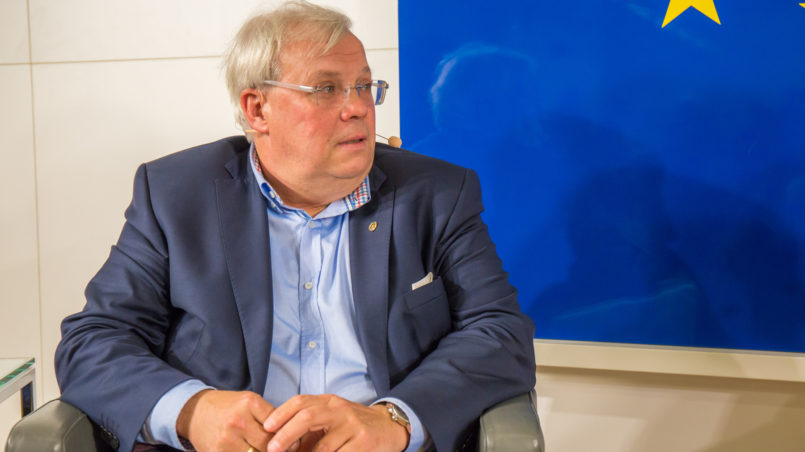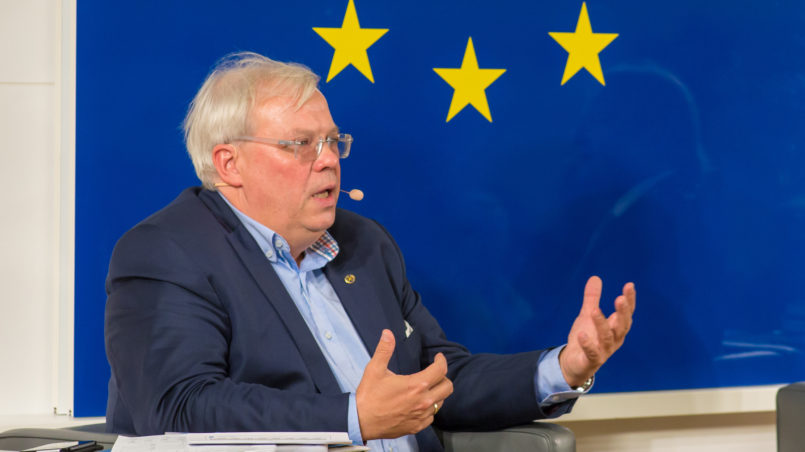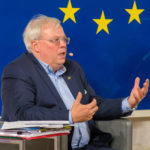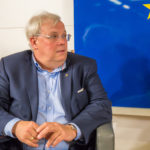ORF Correspondent Mag. Wehrschütz: About the EU and the Ukraine

Event data
- Datum
- 11. 10. 2016
- Host
- Haus der Europäischen Union
- Event-type
- Podiumsdiskussion
- Participants
- Mag. Christian Wehrschütz, ORF-Korrespondent, Balkan-Experte
- Benedikt Weingartner, Moderator
This is a further article in the Europa DIALOG series, which, as always, was led by the pleasantly relaxed Benedikt Weingartner in the Haus der Europäischen Union. I attended and listened attentively:
Mag. Christian Wehrschütz – a longstanding ORF correspondent – was the guest at the Haus der Europäischen Union on Tuesday, 11 October. He is well known from numerous interviews, documentaries, reports from the areas around Kiev – he has been stationed there for two years – and of course from Belgrade. When you ask him about his attitude to the EU, Wehrschütz appears to be greatly disappointed by the European entity and he says:
For me, Europe is more than the EU and its members, who have greatly dashed my hopes.
Dialogue
Your quote: “For me, Europe is more than the EU and its members, who have greatly dashed my hopes”. So you consider the EU to be a key player and uniting force and nevertheless you are disappointed that this is not the case? Why this disappointment?
The Balkan expert replies disappointedly that he expected a strong Europe, a Europe similar to the USA, namely the United States of Europe, with a joint foreign policy, defence policy, armed forces and a common economic framework. Instead, discussions rather centre on “light bulbs”.
However, it has to be pointed out: a union can only be as good as its members. And the EU Member States simply do not fulfill these aims because in sacro egoism – in the sacred egoism at the national level – they are not prepared to give up competences in these core areas and foreign policy is still made at the national level.
Wehrschütz considers Europe to be in a crisis: Great Britain will probably be lost. This discord would certainly have a very detrimental effect on foreign policy …
Since Margaret Thatcher the special treatment of Great Britain has got on my nerves.
But still he sees a “good divorce” better than a “bad marriage”. Now groundbreaking negotiations have to be held in a manner that does not encourage other states to seek similar special treatment. In order to ensure that further “exits” can be prevented. Clear positions of a strong Europe are needed – not only from the Slovenian President Borut Pahor but also increasingly from other states. According to Wehrschütz, Gerd Bacher (the deceased ORF Director) once said – and this should not be regarded as an insult for our country:
Austria is like flyspeck on the map,
and could, according to Wehrschütz, only play a role “in cooperation”. Global challenges would require minimum European consensus – and he would like to hear this message much more often than he does.
Expansion perspectives as regards consensus: the Ukraine. The convergence of the Ukraine in the EU has provoked conflicts. How do you see this: was it good for the Ukraine to move towards Europe or was it disadvantageous?
He regards the move as correct, but the process would certainly take 20-30 years. Until now there has been a constant toing and froing – depending on the political leadership – between a policy on Russia and a move towards the EU and now, finally, a decision has been taken and it requires implementation. From an economic perspective, the Ukraine is in a process of reorientation. A rapprochement to Europe would be economically significant for the Ukraine: the orientation to all the European standards in industrial production in all the norms which exist. And it would be difficult to implement these standards in all industries: in agriculture, in the small dairies if, e.g. the certificate of origin were important, then where the milk ultimately comes from.
What he finds particularly annoying is the cardinal sin of the EU in its failure to give the Ukraine – like every other European state – no prospects for accession.
I find it absurd to negotiate with Turkey – even if I the historical reasons for this are clear to me – but not to give the Ukraine this possibility and the chances which the EU could provide.
How do the Ukrainian people feel as regards Europe? From a geographical perspective, the Ukraine is the largest country on the European continent. Do the Ukrainians feel a part of Europe?
The correspondent in principle vehemently rejects the term “Europe” for the EU and considers Europe to be “bigger” and continued that, in Serbia and the Ukraine, the separation into “us” and “Europe” is still commonplace as regards political awareness. The east-west divide still exists – as highlighted in surveys and, in one survey, the title of which was “Do you think it is important that the Ukraine joins the European Union?”, the results were as follows:
- West Ukraine: Yes: 77.4 %
- Central Ukraine: Yes: almost 56%
- South Ukraine (Odessa): Yes: 32%
- East Ukraine: Yes: 30% No: almost 58% (the highest!)
- in Donbass: Yes: 34% No: 53%
According to Wehrschütz, these results are also connected to the fact that the economic relationships of the heavy industries in eastern and southern Ukraine are traditionally aligned to the Russian market. Many modernization measures have not been implemented because the Ukraine can hardly compete in the European market. Also family ties with Russia could also be a reason for the results: hundreds of thousands of Ukrainians worked in Russia before the crisis.
Two years ago the suspension of the Association Agreement of the previous government was the trigger for the Euromaidan. Has anything changed in the meantime?
The ousting of Wiktor Janukowytsch as President was the initial trigger for the suspension of the Association Agreement. Contrary to dominating mainstream journalism, in which Maidan was seen as the “glowing European”, after the first student demonstrations, this quickly turned to a demonstration against the corrupt regime, against Wiktor Janukowytsch. Neither the European perspective nor the EU no longer played a significant role for the people because they appeared to be too remote. One wanted to get rid of Janukowytsch.
Many problems, which induced Janukowytsch not to sign, are still present today. According to Wehrschütz, he did not not sign because he had suddenly changed from a “glowing European”, which he had never been, to a “glowing Putin lover”:
The man was 1.5 years away from the next presidential election and could no longer pay salaries and wages, the EU, in consultation with the IWF, had offered him 600 millionCURRENCY????? and Putin had offered him 15 billionCURRENCY, tax free.
Wehrschütz further stressed that daily struggle of the population: for example, a doctor officially earns $100/month. The head of the international migration organisation in Kiev recently reported in an interview: there are 1.5 million domestic displaced persons. Incidentally, further evidence of how waves are shown – or not shown – in the media: they appear to be practically forgotten if there are no mass images. 43% of these people have no salary, 18% only partially and many people have to survive on 1,400 Krim Hryvnia per month – equivalent to 54 Euro.
Even if the shadow economy, corruption and measures taken to ensure one’s survival are taken into account: the average Ukrainian suffers other problems which reduce his interest in the question of whether or not Ukraine could become a member of the EU in 15 years or how the EU will be post-Brexit or in two years.
But the Ukraine received money from the EU. Two years ago, 11 billion CURRENCY??? were promised? Did the money arrive? What was the effect?
Even if money did come: from the money that was made available by the EU – not only in the Ukraine – all experts who the EU also financed were included. And: there are at times very good experts. Further, the “old boy network” through which one or the other politician got a job, had to be considered. In principle the money did arrive.
And the EU worked on both the micro and macro level with seminars on the reform of the police to training and support of small and medium-sized companies but still:
The EU, also as an institution, is simply a catastrophic self-marketer. Perhaps we can talk about this in relation to the Balkans. The majority of the population are of course not aware of this. A politician is not interested in saying: The money came from the EU, but rather claims: ‘I did this.’
According to the expert on the Ukraine, however, modernization in the Ukraine can only occur with the support of the EU. At the moment negotiations are taking place as regards a reform of the trade agreement because the Ukraine very quickly fulfills the quotas which it has for agricultural products. The fact alone that agriculture is a decisive export factor in the Ukraine and that success could be found in third markets with meeting EU standards is, according to Wehrschütz, in any case a positive sign.
The Association Agreement has been signed by the new President. But in the Ukraine, and we hear this almost daily, a war is going on, namely in the east; you regularly report from there. What areas of tension are there as regards the Russian influence?
Let’s not overestimate the situation: there is no war going on in the Ukraine. Rather, even if one includes Crimea, 7% of the Ukrainian territory is affected by war. As a comparison, if there was flooding in Bregenz, nothing would be noticed in Vienna. The Ukraine is such a huge country.
The problem is, in the opinion of the Ukraine expert, that, on the one hand, those who are in power in Donezk and Luhansk as well as those in Kiev have more or less gotten used to the status quo. One has to ask whether it would not be more costly for the political elite to change this status quo. There are three pilot projects for the disengagement of troops and that has eventually functioned but the reintegration of these areas and the question of who will pay for the reconstruction and what the political role of the Ukraine will be are the true, great hurdles.
Two years of war, stresses Wehrschütz, have alienated these parts of the population, also via the media. Surveys show that, e.g. in territory controlled by the Ukraine, 54% of the population are already against a special status and similar.
The real tragedy in the whole affair is actually the suffering of the civil population.
Approximately 26,500 people cross the ceasefire line at three points where this is possible every day. They have to wait 24 hours and more due to the thorough controls – for the civil population who have to cross this signifies a great burden.
We have a village in the border region between Donezk and Mariupol (a harbor town), there seven or eight children go to the Ukrainian side to school. Every day they have to cross the ceasefire line.
Pensioners suffer too because Kiev have stopped paying pensions to those who live on this territory. There is no real reintegration strategy to be seen but rather these areas are becoming increasingly “Russified”. Due to the trade embargos, Ukrainian products are hardly available anymore and the Ruble is the currency.
Super business for the local smugglers and the rich upper classes:
I was in the most expensive supermarket in Donezk, when it re-opened. Top brand handbags had been smuggled from Poland and the shoes from Slovakia. This definitely leads to a criminilisation of the economy and that is also worrying. Regardless of the fact that the territory is too big to become something like Transnistria.
In what way was the European Union a peace broker? Minsk II is now valid – Angela Merkel and Francois Hollande in particular had a prominent role. What was the extent of the role of the EU?
The solution was more bilateral rather than the EU taking control, replied Wehrschütz. Despite the importance of the EU as an aid factor, the negotiations in Minsk in particular emphasized a bilateral solution: Merkel, Hollande, Putin and Poroschenko. Attempts were made to create a peace plan to which Wehrschütz did not see any alternative. This is typical for the politics of the European central powers and not the EU. Essentially, the entire mediation work lay in the hands of the OSCE.
Austria will take on the OSCE presidency on 1 January. This observer mission is very important.
… The Americans?
If people listen to anyone, then the Americans, according to Wehrschütz. This attitude will change in the next few months due to the growing fear of the Ukraine as regards a possible American “power vacuum”. It is also no secret that the Ukraine is against Trump and pro Clinton. This is grounded on the fact that the former election campaign manager of Donald Trump also had his “connections” to the Janukowytsch regime in the Ukraine.
I rather have the feeling that much too little impact can be made as would be necessary– less in foreign policy rather more in the fight against corruption and similar that dominate in the Ukraine. On the other hand, we demand reform, from the Balkans to the Ukraine and other states, reform which simply cannot be implemented in many countries.
A small dig: We have a much acclaimed reform partnership in one federal province because the Landtag (federal state parliament) could be reduced by seven members and one state minister was done away with. Measured against the demands for reform made on Serbia and in the Ukraine, this is really a negligible reform effort.
Winter is approaching. In the Ukraine it comes earlier than here. It will be harder. Is it feared that Putin will turn off the gas supply and/or that Poroschenko turns off the gas supply to the Crimea?
The entire question of energy supply has turned completely and that is also a reason why Wehrschütz believes that the Russian Ukraine-policy is ultimately a fiasco: today the Ukraine buys its gas on the international gas market, above all in Europe and, therefore, the dependence on Russian gas has decreased drastically und ein Wettlauf gegen die Zeit????. Europe is trying to become less dependent on the pipeline system, on the “Druschba”, via the Ukraine. The plan is to build Nord Stream 2 and, as a result, the Ukraine would further lose its geo-strategic significance in the medium term. With this change in the purchasing flows, Ukraine’s gas supply would be safeguarded.
Russia and the Ukraine are permanently fighting a trade battle; with a practical breakdown of the Ukrainian Russian trade, which previously represented one-third of all economic areas – in the meantime it has sunk to around 10%.
What is the role of Vladimir Putin? Has he lost some influence as a result of the Ukraine conflict or has he become stronger?
Wehrschütz has nothing to do with Russia, with Wladimir Wladimoriwitsch Putin; therefore he finds it difficult to give a first-hand report. Considered from an analytical perspective, one could say that Putin – according to surveys – without a doubt became stronger for a while because, on the one hand, people rally around top politicians when they are being attacked; and this Russian “Waldheim effect” can be felt very strongly there.
On the other hand, he believes that the result of the Russian policy on the Ukraine is actually very negative and almost catastrophic for Russia in the long term. Why? The Ukrainian armed forces were in a terrible state and, during this conflict, they suddenly began to be built up. The Ukrainian national consciousness was, before Putin, more than underdeveloped.
In the Ukraine, Putin played a role similar to Napoleon in the wars of liberation against the French. The awakener of the Ukrainian national consciousness. Putin made enemies of 40 million Slavs. If the Ukraine continues as it does, it will become a second Poland from an emotional attitude.
In the second part Mag. Christian Wehrschütz reports on his profound experiences in all of the Balkan regions. It will be deeply informative and highly interesting. I promise.
Translation into English: Donna Stockenhuber



